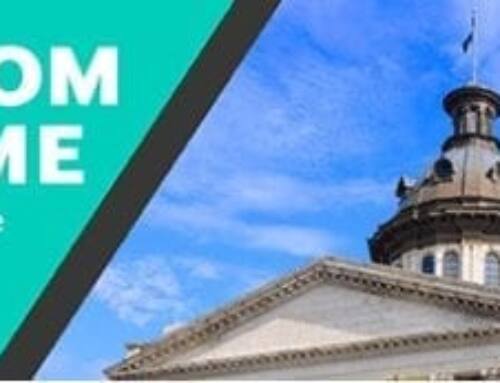Friday, Sept. 11, 2020
The Senate Finance Committee passed its version of the FY20-21 state budget and authorization for the remaining CARES Act funds. The House Ways and Means CARES Act Subcommittee adopted its authorization for CARES Act funding. The full House Ways and Means Committee meets Friday afternoon.
The General Assembly returns next Tuesday for a two-week session.
accelerateSC is a one-stop website to help businesses and citizens connect to important information during this crisis.
BUDGET
The Senate Finance Committee met via Zoom on Tuesday and Wednesday and unanimously adopted a strike and insert amendment to H.5201, the General Appropriations Act. The House had passed its version of the state budget in February.
While it was noted that leadership in the House of Representatives preferred to amend the current Continuing Resolution H.3411 that provides for the continued and uninterrupted operation of state government for the current fiscal year, Senate Finance Committee Chairman Hugh Leatherman (R-Florence) said he felt it was the duty of the committee to pass an appropriations bill. He said the amendment moves the state forward with prudence in light of the ongoing pandemic.
Of the $86 million estimated recurring revenue, the bill appropriates $50 million to the Education Finance Act (EFA), which can be used for teacher salary increases. It also provides $11.7 million to the Local Government Fund. The balance of the estimated revenue, $24 million, would go into a residual recurring fund.
Of the $775 million estimated one-time surplus, the bill would set aside $500 million to a midyear shortfall reserve fund to prevent state agency budget cuts in the event of an economic downturn. The bill also provides the following one-time funding:
- $70 million – Covid-19 Reserve Account
- $50 million – Department of Corrections
- $34 million – Charter Schools
- $20 million – Essential state employee hazard bonus pay ($1,000 each, earning under $50,000);
- $6 million – School nurses
- $40 million – Parks, Recreation and Tourism advertising
- $17 million – Department of Mental Health for Veterans Nursing Home construction
- $5 million – ReadySC for workforce training
- $4.1 million – Elections Commission for poll workers
- $28 million – Residual non-recurring account
The committee also approved Phase II of the remaining $668 million from the CARES Act. Authorization includes:
- $420 million – Unemployment Insurance Trust Fund
- $100 million – local governments and colleges mitigation
- $75 million – DHEC
- $20 million – MUSC
- $20 million – Grant program for nonprofits (food, rent, housing, utilities, mental health grants from $2,500-$50,000)
- $20 million – Minority Relief Grant Program funding
Both bills will be on the Senate calendar and will be debated by the full Senate beginning next week.
Committee handouts can be found here.
TAX
The House Ways and Means Property Tax Subcommittee met on Friday, Sept. 4, and favorably approved S.545 (Senator Alexander) relating to assessing property of businesses and other entities. The bill relates to business personal property and requires filing through the Department of Revenue.
The bill, which passed the Senate in March, requires all counties to use the DOR-approved PT-100 form for filing business personal property assessments. The bill is on the agenda for the full House Ways and Means Committee meeting scheduled for 1 p.m. Friday. The meeting will be streamed live and can be viewed here. UPDATE: S.545 made it out of the full Ways and Means Committee on Friday afternoon, and it is expected to receive its second and third readings in the house next week.
HOUSE WAYS AND MEANS CARES ACT SUBCOMMITTEE
The House Ways and Means CARES Act Ad Hoc Subcommittee held its final meeting on Wednesday. The committee adopted an amendment approving Phase II authorization of the remaining $668 million from the CARES Act. The subcommittee plan closely resembles what was adopted by the Senate Finance Committee earlier that day. It includes:
- $420 million – Unemployment Insurance Trust Fund
- $73 million – DHEC
- $20 million – MUSC
- $120 million – State and local governments and college mitigation
- $10 million – Grant program for nonprofits
- $45 million – Minority Relief Grant Funding
Under the previous authorization adopted by the General Assembly, only public sector entities and hospitals were eligible for reimbursement. The subcommittee was formed by House Ways and Means Chairman Murrell Smith (R-Sumter) to assist the committee in determining how to allocate Phase II of the CARES Act funding. The plan will go before the full House Ways and Means Committee on Friday afternoon.
Committee handouts can be found here.
GENERAL BUSINESS
The Senate Finance Committee on Tuesday adopted H.4431 (Reps. Jordan, Fry, Rose, Forrest and others) relating to business license tax standardization. The House had previously passed the bill in February. The business community has long argued our current system is complex, costly and lacks transparency. In South Carolina, 231 municipalities and nine counties have a business license tax, which creates confusion and adds costs to small businesses trying to comply.
After five years of discussions, stakeholders finalized a compromise agreement, thus allowing the bill to move forward. The bill includes:
- Standardized filing for taxpayers
- Online payment portal to pay all business taxes in one place
- Creates a uniform appeals process before the Administrative Law Court
- Clarifies definition of gross income
- Prohibits jurisdiction from sharing private data
- Businesses not wanting to utilize the portal may file in person, by telephone or by mail
The bill now goes to the full Senate for consideration next week.
CORONAVIRUS
Gov. Henry McMaster submitted his recommendations on Thursday to the General Assembly for the Phase II authorization for expenditure of Coronavirus Relief Funds (CRF) from the federal Coronavirus Aid Relief and Economic Security (CARES) Act. His recommendations include an additional $450 million to replenish the Unemployment Trust Fund. The governor’s letter can be viewed here.
To view all of the governor’s previous Executive Orders, click here.
For more information from SC DHEC on the virus, click here.
The DHEC Care Line is available to provide general information about COVID-19 by calling 1-855-472-3432 from 8 a.m.-6 p.m., seven days a week.
COVID-19 Screening & Testing Sites
Other helpful links:
The Emergency Management Division provides links to important information, including the SC Department on Aging, SC Childcare, the SC Department of Employment and Workforce, the Department of Revenue and the SC Department of Insurance.
South Carolina Department of Commerce for small business information and assistance.
For additional resources that may be beneficial to your organization’s recovery efforts, visit Haynsworth Sinkler Boyd’s COVID-19 Resources page (Copper Dome Strategies is a subsidiary of HSB).
South Carolina Health Alert Network
South Carolina COVID-19 Emergency Supply Sourcing & Manufacturing
SINE DIE RESOLUTION
The General Assembly adopted a Sine Die Resolution, S. 1194, which allows them to continue past the mandatory May 14 Sine Die deadline to complete unfinished business.
Each House will stand adjourned to meet at the call of the President Pro Tem of the Senate and the Speaker of the House of Representatives. The resolution further authorizes the General Assembly to meet again in statewide session on Tuesday, Sept. 15 at noon and continue in statewide session until Sept. 24 for the consideration of specific matters, including the annual General Appropriations Act.
Unless the session is otherwise adjourned Sine Die at an earlier date, the 2020 session of the General Assembly shall stand adjourned Sine Die not later than 11:59 p.m. on Sunday, Nov. 8, 2020.
UP NEXT
The General Assembly returns to session Tuesday at noon.
REARVIEWS 2020
Thank you for following SCACPA’s ‘The View from the Dome’ for State House Developments on Tax Issues Through SC’s 2020 Legislative Session. Here is a review of our weekly updates.
Jan. 10: South Carolina’s Pending Tax Bills and Your 2020 Legislative Preview
Jan. 17: Gov. McMaster’s Executive Budget Calls for Tax Cuts, Rebates for Taxpayers
Jan. 31: House Subcommittee Hears Budget Request from SC Chief Justice to Improve Case Management System
Feb. 7: Senate Finance Committee Approves Business Personal Property Bill for DOR Filing
Feb. 14: Board of Economic Advisors Announces Largest Budget Surplus in SC History
Feb. 21: House Floor Debate is Up Next for Budget After Ways and Means Committee Plan Adopted
Feb. 28: House Members Have Upcoming Week to Study Budget Before Floor Debate
March 6: Education Reform Bill Moves from Senate to House; DHEC Tells of Coronavirus Resources
March 20: A Look Inside the $45M COVID-19 Relief Package for DHEC; Return of Legislators is on Hold
March 27: Legislative Session Remains Postponed; Candidate Filing Period Ends on March 30
April 17: McMaster Announces ‘Accelerate South Carolina’ Revitalization Plan, Details to Come
April 24: accelerateSC Revitalization Task Force Goes to Work
May 1: General Assembly Set to Return to State House on May 12
May 8: Gov. McMaster Announces that Indoor Dining in SC Can Resume on May 11
May 29: Gov. McMaster Will Now Review accelerateSC Committee’s Final Recommendations
June 12: Gov. McMaster Recommends Disbursal of $1.9B Coronavirus Relief Fund in Two Phases
June 19: Senate Finance Committee’s Plan for CARES Act Funds Includes $500M for Unemployment Trust Fund
June 26: $1.2B in Federal CARES Act Funding is Authorized
July 10: accelerateED Task Force Offers its Guidance for 2020-21 School Year
July 31: Board of Economic Advisors Anticipates SC’s 2019-20 Surplus as $220M
Aug. 7: Legislative Committees Discuss Regulatory Relief, Broadband Access and Testing Efforts
Aug. 14: Joint Bond Review Committee Approves Highway Projects, Seeks More Funds for Rural Broadband
Aug. 21: Gov. McMaster Urges Cabinet Agencies to Maintain Funding Levels from Continuing Resolution For Now
Aug. 28: Comptroller’s Office Announces $350M Surplus for FY 2019-20
Sept. 4: Latest BEA Projection is $775M in One-Time Surplus Revenue
To keep up with the latest news of SCACPA Advocacy, turn to the SCACPA Blog and our social media outlets.


